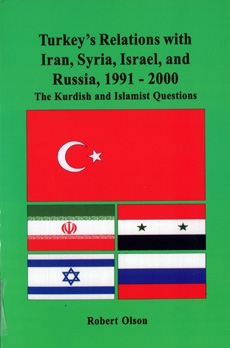
Turkey’s Relations with Iran, Syria, Israel, and Russia, 1991 - 2000
Robert Olson
Mazda Publishers
This volume, the second in the Kurdish Studies Series by this publisher, focuses on the role of the Kurdish and Islamist questions in Turkey’s foreign policies with Iran, Syria, Israel and Russia from the end of the Persian Gulf War to the end of 2000. The author argues that the Kurdish question, i.e., the transstate aspects of the challenge of Kurdish nationalism coupled with the Islamist question, i.e., the challenge of contending political groups using the discourse of Islam, were the two major challenges to Turkey’s domestic and foreign policies during the decade of the 1990s. He argues further that the overlapping of the two questions presented a potent challenge to the stability of the Turkish state and contributed to the unraveling of the U.S.’s policy of “dual containment” implemented toward Iraq and Iran in the wake of the Persian Gulf War.
The two questions were dominant in Turkey’s relations with Iran and with Russia. The Kurdish question, with the attendant issue of water, dominating Ankara’s relations with Syria and the challenge of Kurdish nationalism was one of the main factors compelling Turkey to seek closer relations with Israel in the early 1990s.
“The end of the Cold War transformed Turkey’s foreign policy in many ways. The disintegration of the Soviet Union and the Islamic Revolution in Iran added new twists to the tortuous relations among Ankara, Moscow and Tehran. And the emerging Turkish-Israeli relationship will undoubtedly have far-reaching implications for Turkey’s relations with its neighbors. This book has tied these developments together and has presented us with a remarkable picture of the challenges facing Turkey as it navigates to chart a new course for itself in this geostrategic labyrinth. Robert Olson has an international reputation as a trailblazer in the academic study of Kurdish issues and Turkish-Kurdish relations. In this highly informative, analytically sound, and scholarly rigorous book, Professor Olson sustains that reputation.”
—Nader Entessar, Spring Hill College | 